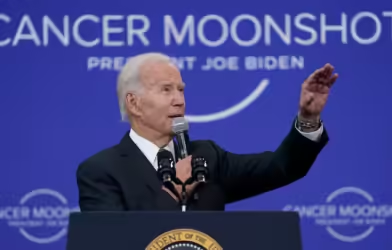Vinesh Phogat is one of India’s most decorated wrestlers. She has captivated the world with her tenacity, spirit, and sheer will to overcome adversity. As she prepared for the Paris 2024 Olympics, Vinesh was not just another athlete. She was a symbol of hope, resilience, and the unyielding pursuit of excellence. However, her journey to Paris, while inspiring, has been marred by a heartbreaking incident. That has sparked global discussions on fairness, athletic regulations, and the challenges faced by women in sports.
Vinesh Phogat – From Haryana to the World Stage
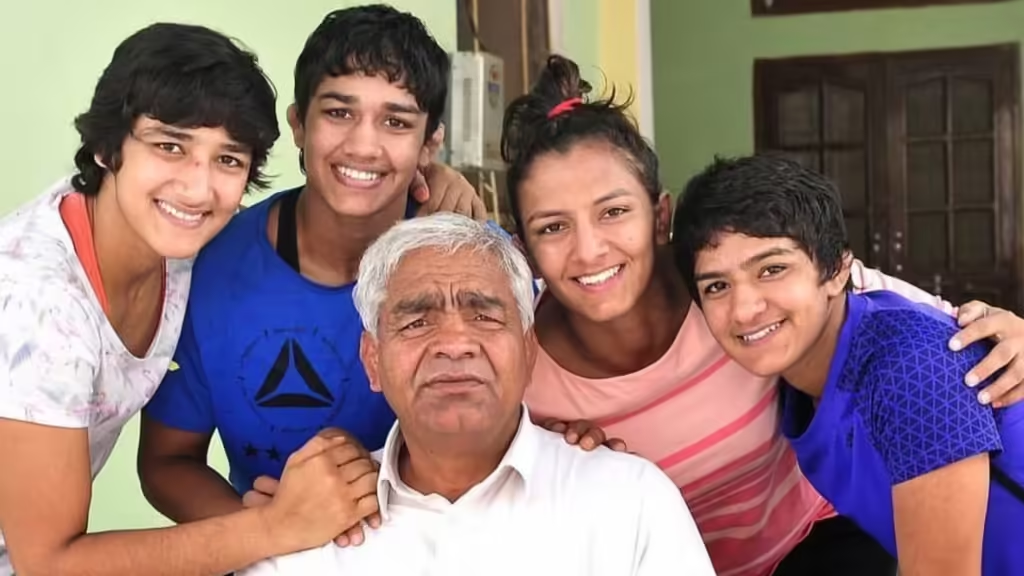
Born into the legendary Phogat family of Haryana, Vinesh Phogat was destined for greatness from a young age. Her family, particularly her cousins Geeta and Babita Phogat, played a significant role in shaping her career. Vinesh quickly rose through the ranks in Indian wrestling. She displayed early signs of the brilliance that would later define her career.
Growing up in a family where wrestling was not just a sport but a way of life. Vinesh was immersed in rigorous training from a young age. Her early mornings started with long runs, strength training, and hours of drilling on the mat. She did this under the watchful eye of her uncle and coach, Mahavir Singh Phogat. The Phogat family’s commitment to wrestling, particularly for their daughters, was revolutionary. In a region where traditional gender roles often restricted women from pursuing sports, they stood out. Vinesh’s upbringing was a mix of discipline, hard work, and a relentless pursuit of excellence. Laying the foundation for her future success on the global stage was the result of it.
Her international breakthrough came at the 2014 Commonwealth Games. She won her first gold medal, announcing her arrival on the global stage. This victory was just the beginning of what would become an illustrious career marked by multiple medals in international competitions. Her achievements including the Asian Games and the World Wrestling Championships are notable.
The Rigorous Training Regimen of Vinesh Phogat
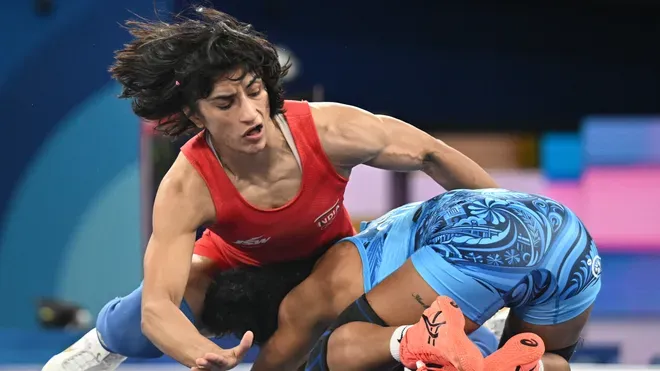

To understand Vinesh Phogat’s success, it’s crucial to appreciate the rigorous training regimen that has shaped her career. Wrestling, especially at the elite level, demands a combination of strength, endurance, technique, and mental toughness. Vinesh’s daily routine reflects this need for comprehensive preparation.
Vinesh’s training typically involves two to three sessions per day, each focusing on different aspects of her wrestling skills. Mornings are often dedicated to cardiovascular conditioning, which includes long-distance running, sprints, and high-intensity interval training (HIIT). These sessions build the endurance necessary to last through multiple rounds in a tournament. Here fatigue can be a significant disadvantage.
Strength training is another critical component of Vinesh’s regimen. Wrestling requires explosive power, which she develops through weightlifting, plyometrics, and bodyweight exercises. Squats, deadlifts, and bench presses are staples in her routine. They help her build the muscle mass and power needed to overpower opponents on the mat.
In the afternoons, Vinesh focuses on technique and sparring. Wrestling is as much about strategy and skill as it is about physical strength. During these sessions, Vinesh works on refining her moves, improving her takedowns, and developing counterattacks. Sparring with partners allows her to simulate match conditions. By doing that, she can test her techniques and strategies against different styles of wrestling.
Evenings are often reserved for recovery and mental conditioning. Vinesh understands the importance of recovery in preventing injuries and maintaining peak performance. Her recovery routine includes stretching, yoga, and sometimes physiotherapy to address any muscle soreness or minor injuries. Mental conditioning involves visualization exercises. She mentally rehearses her matches, visualizing various scenarios and how she would respond to them. This mental preparation is crucial for maintaining focus and composure during high-stakes competitions.
Injuries, Setbacks, and the Fight Vinesh Phogat faced for Justice
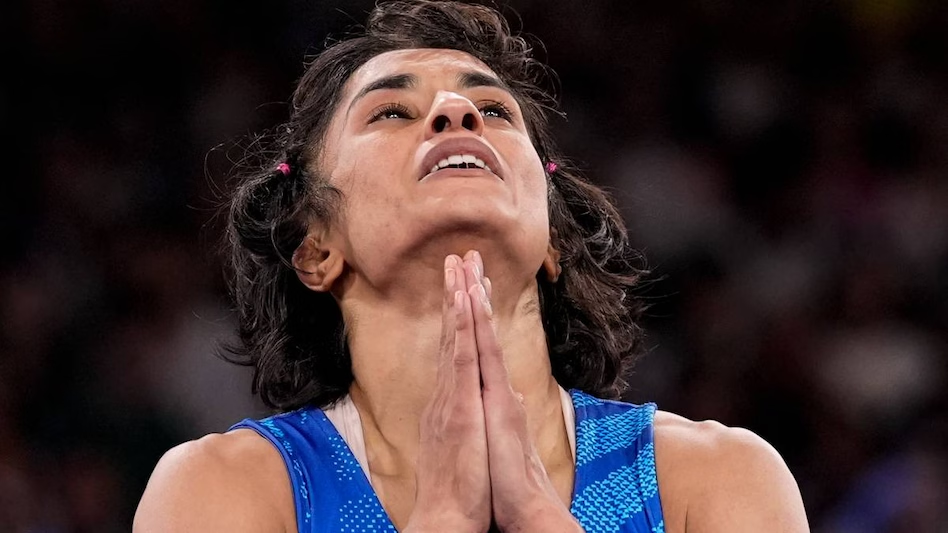
Injuries
Vinesh’s career has not been without its challenges. The most significant setback came during the Rio 2016 Olympics. This is when she suffered a severe knee injury that ended her campaign prematurely. The image of Vinesh being stretchered off the mat was a painful reminder of the fragility of an athlete’s career. However, this injury only strengthened her resolve. After a long and painful recovery, Vinesh returned to the sport with renewed vigor, securing a gold medal at the 2018 Asian Games.
Chain Reaction
This knee injury was not just a physical blow; it also tested Vinesh’s mental strength. The rehabilitation process was grueling, involving months of physiotherapy, strength training, and gradual reintroduction to wrestling drills. There were moments of doubt, where the fear of re-injury loomed large. Yet, Vinesh’s determination to return to the mat never wavered. Her successful comeback was a testament to her mental resilience, as much as her physical recovery.
Struggle Continues
Her struggles, however, were not limited to physical injuries. In 2023, Vinesh was at the forefront of a major protest against the Wrestling Federation of India (WFI), accusing top officials of sexual harassment and corruption. Alongside other prominent wrestlers, Vinesh took a stand, demanding accountability and systemic change. This protest highlighted the broader issues faced by female athletes in India and underscored Vinesh’s role as a leader not just in sports but in the fight for justice.
The Protest Effect
The 2023 protests were a pivotal moment in Indian sports history. Vinesh and her fellow wrestlers, including Sakshi Malik and Bajrang Punia, accused several WFI officials, including the president, of sexual harassment and mismanagement. These allegations shook the foundations of Indian wrestling, leading to an unprecedented movement for change. Vinesh’s courage in speaking out inspired many other athletes to come forward with their own stories, shedding light on the often-hidden issues within sports federations.
Challenges That Followed
The protests were not without their challenges. Vinesh and her fellow protesters faced significant backlash from various quarters, including threats of legal action and attempts to discredit their claims. Despite this, they remained steadfast, organizing sit-ins, press conferences, and marches to keep the issue in the public eye. The movement gained widespread support from civil society, women’s rights organizations, and the general public, who rallied behind the athletes in their demand for justice.
The impact of these protests went beyond wrestling. They sparked a broader conversation about the treatment of women in sports, particularly in countries where traditional patriarchal values still hold sway. The issues raised by Vinesh and her fellow wrestlers highlighted the need for systemic reforms, not just in wrestling but across all sports disciplines in India. The government eventually intervened, promising an inquiry into the allegations and the restructuring of the WFI. This was a significant victory, though the fight for lasting change continues.
The Road to Paris 2024: Highs and Lows for Vinesh Phogat
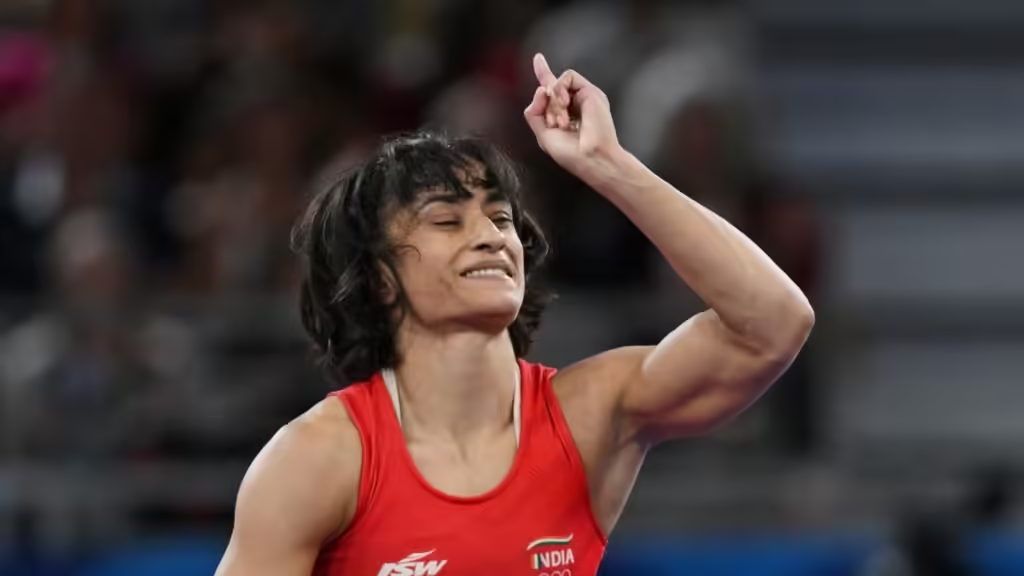
Pilot
The journey to Paris 2024 was supposed to be the crowning glory of Vinesh’s career. After a stellar performance in the Asian Wrestling Olympic Qualifiers, she secured her spot for the Paris Olympics, raising hopes of a historic medal for India. However, the road to Paris was fraught with unexpected challenges.
Workout
In the lead-up to the Olympics, Vinesh maintained a rigorous training schedule, balancing intense preparation with her ongoing activism. Her focus on both the physical and mental aspects of her preparation was evident in her performances, where she demonstrated improved technique, speed, and strategic acumen. Her supporters and coaches believed that Paris 2024 would be the culmination of her years of hard work and dedication.
Twist
However, in a dramatic and heartbreaking turn of events, Vinesh was disqualified from the women’s 50kg freestyle final for being just 100 grams over the weight limit. This disqualification was a crushing blow, not just for Vinesh but for the entire nation that had pinned its hopes on her. The margin by which she missed the weight limit—merely 100 grams—sparked a global debate on the strictness of Olympic regulations and the immense pressure athletes face in maintaining weight categories.
Climax
This incident brought to the fore the intense physical and psychological demands placed on athletes, especially in sports like wrestling, where weight management is crucial. For months leading up to the competition, Vinesh had to adhere to a strict diet and exercise regimen to maintain her weight category. The slightest deviation in diet, water intake, or even natural body fluctuations could tip the scales, as it did in Vinesh’s case. The heartbreak of missing the weight by such a small margin was compounded by the knowledge that all her preparation and hard work had been undone by something so seemingly trivial.
The Global Reaction: Support, Critique, and Calls for Change

The news of Vinesh’s disqualification quickly spread, prompting a wave of reactions from around the world. Prominent sports figures, fans, and commentators took to social media to express their shock, disappointment, and support for Vinesh. The hashtag #JusticeForVinesh began trending, with many questioning the rigidity of the rules and advocating for a more humane approach to weight management in sports.
Other Media Responses
ESPN
Highlighted the technical challenges of weight management in wrestling, pointing out that even a small miscalculation can have devastating consequences. The article included opinions from sports scientists and wrestling experts who argued for a re-evaluation of the rules to prevent such incidents in the future. They discussed the possibility of introducing more flexible weight categories or allowing minor allowances for discrepancies, especially in major competitions like the Olympics. This would help mitigate the immense pressure athletes face and reduce the likelihood of such heartbreaking disqualifications.
BBC Sport
Offered a comparative analysis, looking at similar incidents in other sports and how they were handled. The discussion extended to the psychological impact on athletes who face disqualification for such minor infractions, often after years of rigorous preparation. The BBC piece emphasized the importance of considering the mental health of athletes when drafting and enforcing regulations. It suggested that sports governing bodies should explore more athlete-centric approaches that prioritize well-being over strict adherence to rules that may no longer be fit for purpose.
The Times of India
Focused on the outpouring of support for Vinesh from her fellow athletes and the public. The newspaper drew connections between this incident and the broader issues that Vinesh had been fighting against, including the ongoing protests against the WFI. The Times of India highlighted the symbolic significance of Vinesh’s struggle, viewing it as part of a larger battle for fairness and justice in sports. The public reaction in India was one of solidarity, with many viewing Vinesh’s disqualification as yet another example of how systemic issues in sports governance can harm even the most dedicated and talented athletes.
The Guardian
Provided a critical perspective, questioning whether the strict regulations truly serve the spirit of the Olympics. The article argued that the incident highlighted the need for a more balanced approach that considers the mental and physical well-being of athletes, rather than just rigidly enforcing rules. The Guardian called for a rethinking of how sports regulations are designed and implemented, suggesting that the focus should shift from punitive measures to supportive frameworks that help athletes perform at their best without compromising their health or dignity.
Beyond the Disqualification: Broader Implications and the Way Forward
The disqualification of Vinesh Phogat has reignited discussions on the ethics of weight management in sports, particularly in wrestling. Many experts have called for reforms in how weight categories are managed, suggesting that small allowances should be made for minor discrepancies, especially in high-stakes competitions like the Olympics.
This incident also raises questions about the broader culture within sports federations, particularly in developing countries. The immense pressure on athletes to meet exacting standards, often without adequate support, can lead to situations like Vinesh’s, where a small error has life-altering consequences. The debate continues as to whether the rules should be reformed to prevent such incidents from occurring in the future.
There is a growing consensus that sports organizations need to adopt a more holistic approach to athlete welfare. This includes providing better nutritional guidance, psychological support, and flexibility in regulations that account for the natural variations in an athlete’s body. The discussion around Vinesh’s disqualification could serve as a catalyst for these changes, pushing the sports community to reconsider the balance between competition and compassion.
Vinesh Phogat: The Legacy of a Champion
Despite the setback at the Paris 2024 Olympics, Vinesh Phogat’s legacy as one of India’s greatest wrestlers is secure. Her journey, marked by incredible highs and devastating lows, is a testament to her resilience and determination. Vinesh’s story is not just about her achievements on the mat but also about her courage to stand up for what is right, both in her sport and in society.
As the world watches, Vinesh’s next steps will undoubtedly be followed with keen interest. Whether she continues to compete or shifts her focus to other battles, one thing is certain: Vinesh Phogat will continue to inspire generations of athletes with her story of grit, determination, and unwavering spirit.
Vinesh’s impact extends beyond the wrestling mat. She has become a symbol of strength and perseverance, not just for aspiring athletes but for anyone facing adversity. Her story resonates with millions, reminding us that true greatness is defined not by the absence of obstacles, but by the courage to overcome them. As she navigates the next chapter of her life, whether in wrestling or in new ventures, Vinesh Phogat will undoubtedly leave a lasting legacy that transcends sports.
FAQ
Q: What was the major setback Vinesh Phogat faced during the Paris 2024 Olympics?
A: Vinesh Phogat was disqualified from the women’s 50kg freestyle final for being 100 grams over the weight limit.
Q: How did Vinesh Phogat react to her disqualification?
A: Vinesh’s disqualification sparked a global debate, with many calling for changes to weight management rules in wrestling.
Q: What was the impact of Vinesh Phogat’s protest in 2023?
A: Vinesh’s protest against the Wrestling Federation of India highlighted the challenges female athletes face and called for systemic change.
Q: What legacy has Vinesh Phogat left in Indian wrestling?
A: Despite setbacks, Vinesh Phogat is celebrated for her resilience, achievements, and leadership in advocating for justice in sports.
Q: What are the broader implications of Vinesh Phogat’s disqualification?
A: The incident has reignited discussions on the ethics of weight management in sports and the need for reform in regulations.








